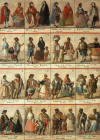
The Cultural Construction of Race and Law: Spanish Colonialism and Castas
One of the ways to understand Marx's conception of ideology is to look at race itself -- not racism, but the actual concept of "race" as a category of human being -- as ideology.
As we soon learn in Douglass's Narrative, race is a fluid concept, rather than one set in stone -- a child born of a white father and a black mother was...black, and therefore a slave. As you've probably already figured out from looking at your own parents and grandparents and sibling and cousins etc., genetics can be a wild card, and so while some children with a white and a black parent may look "Mulatto" -- of mixed race -- others may be born looking entirely "white" or entirely "black".
This has of course always been the case and it both challenges the entire conception of race itself (why do we think of Barak Obama as "black" when is as equally "white", and when he was only raised by the "white" side of his family?) and it creates all kinds of legal problems for those attempting to create segregated societies.
While this has always been the case, nowhere is it more obvious than in the Spanish colonial casta system and the often bizarre artwork that it generated. It's nearly impossible to identify the ideologies that drive one's own life or culture, as they are by their very definition unseen assumptions, but it is often easy to see them in cultures that are "foreign" to our own, either by place or by time. In other words, by looking at how seemingly absurd past conceptions of, say, race were, we can better understand how similarly unfounded assumptions drive us today.
As in early America the Spanish American colonies had different sets of laws for different races -- yet the Spanish took the time to break this down into an exceptionally complex system tracking every imaginable mix of peoples over several generations.
Perusing these complex labels and categories -- and reminding ourselves that they exist so that certain people are given or denied certain privileges (ability to own land, vote, hold office, be enslaved) -- suggests how difficult it is to predicate social and legal systems on "race" when the entire concept of race fits neither human behavior or science; that is to say, "race" is something that doesn't actually exist, and yet in the early part of our history both slavery and colonialism necessitated its invention.
| Castes | African | Peninsular | Peninsular | Amerindian | African | ||||
| 1st generation | mulato | criollo | mestizo | zambo | |||||
| 2nd generation (with one Spaniard parent) | morisco | criollo | castizo | moreno | |||||
| 2nd generation (with one Amerindian parent) | chino | mestizo | cholo | cambujo | |||||
| 2nd generation (with one African parent) |